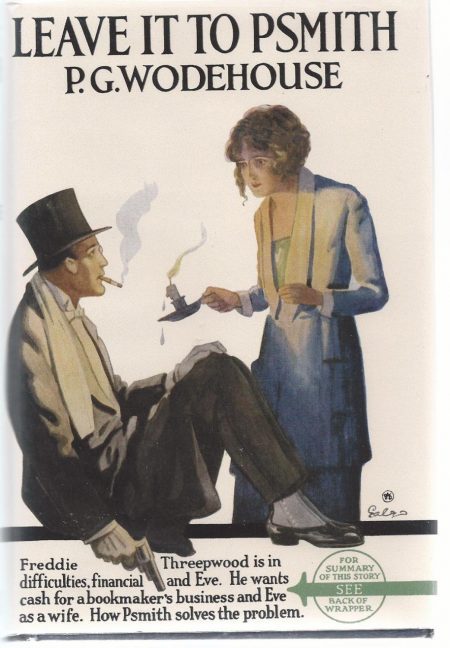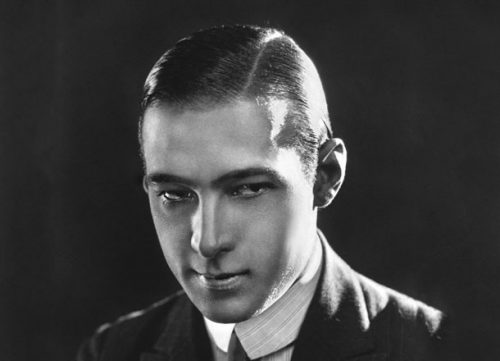LEAVE IT TO PSMITH (13)
By:
March 26, 2019

Leave It to Psmith (1923) is the last and most rewarding of four novels featuring the dandy, wit, and would-be adventurer Ronald Eustace Psmith, one of P.G. Wodehouse‘s most popular characters. (“One can date exactly,” Evelyn Waugh claimed, in reference to Psmith’s debut in the 1909 novel Mike, “the first moment when Wodehouse was touched by the sacred flame.”) Leave It to Psmith‘s copyright enters the public domain in 2019; HiLoBooks is pleased to serialize this terrific book here at HILOBROW. Enjoy!

Lord Emsworth Meets a Poet
I
The rain had stopped when Psmith stepped out into the street, and the sun was shining again in that half blustering, half apologetic manner which it affects on its reappearance after a summer shower. The pavements glistened cheerfully, and the air had a welcome freshness. Pausing at the corner, he pondered for a moment as to the best method of passing the hour and twenty minutes which must elapse before he could reasonably think of lunching. The fact that the offices of the Morning Globe were within easy strolling distance decided him to go thither and see if the first post had brought anything in the shape of answers to his advertisements. And his energy was rewarded a few minutes later when Box 365 on being opened yielded up quite a little budget of literary matter. No fewer than seven letters in all. A nice bag.
What, however, had appeared at first sight evidence of a pleasing ebullition of enterprise on the part of the newspaper-reading public turned out on closer inspection, when he had retired to a corner where he could concentrate in peace, a hollow delusion. Enterprising in a sense though the communications were — and they certainly showed the writers as men of considerable ginger and business push — to Psmith they came as a disappointment. He had expected better things. These letters were not at all what he had paid good money to receive. They missed the point altogether. The right spirit, it seemed to him, was entirely absent.
The first envelope, attractive though it looked from the outside, being of an expensive brand of stationery and gaily adorned with a somewhat startling crest, merely contained a pleasantly worded offer from a Mr Alistair MacDougall to advance him any sum from ten to fifty thousand pounds on his note of hand only. The second revealed a similar proposal from another Scot named Colin MacDonald. While in the third Mr Ian Campbell was prepared to go as high as one hundred thousand. All three philanthropists had but one stipulation to make — they would have no dealings with minors. Youth, with all its glorious traditions, did not seem to appeal to them. But they cordially urged Psmith, in the event of his having celebrated his twenty-first birthday, to come round to the office and take the stuff away in a sack.
Keeping his head well in the midst of this shower of riches, Psmith dropped the three letters with a sigh into the waste-paper basket, and opened the next in order. This was a bulky envelope, and its contents consisted of a printed brochure entitled, ‘This Night Shall Thy Soul Be Required Of Thee’ — while, by a curious and appropriate coincidence, Number Five proved to be a circular from an energetic firm of coffin-makers offering to bury him for eight pounds ten. Number Six, also printed, was a manifesto from one Howard Hill, of Newmarket, recommending him to apply without delay for ‘Hill’s Three-Horse Special,’ without which — ‘Who,’ demanded Mr Hill in large type, ‘gave you Wibbly-Wob for the Jubilee Cup?’) — no sportsman could hope to accomplish the undoing of the bookmakers.
Although by doing so he convicted himself of that very lack of enterprise which he had been deploring in the great public, Psmith placed this communication with the others in the waste-paper basket. There now remained only Number Seven, and a slight flicker of hope returned to him when he perceived that this envelope was addressed by hand and not in typescript. He opened it.
Beyond a doubt he had kept the pick of the bunch to the last. Here was something that made up for all those other disappointments. Written in a scrawly and apparently agitated hand, the letter ran as follows :
If R. Psmith will meet the writer in the lobby of the Piccadilly Palace Hotel at twelve sharp, Friday, July 1, business may result if business meant and terms reasonable. R. Psmith will wear a pink chrysanthemum in his buttonhole and will say to the writer, ‘There will be rain in Northumberland to-morrow,’ to which the writer will reply, ‘Good for the crops.’ Kindly be punctual.
A pleased smile played about Psmith’s solemn face as he read this communication for the second time. It was much more the sort of thing for which he had been hoping. Although his closest friend, Mike Jackson, was a young man of complete ordinariness, Psmith’s tastes when he sought companionship lay as a rule in the direction of the bizarre. He preferred his humanity eccentric. And ‘the writer’, to judge him by this specimen of his correspondence, appeared to be eccentric enough for the most exacting taste. Whether this promising person turned out to be a ribald jester or an earnest crank, Psmith felt no doubt whatever as to the advisabilIty of following the matter up. Whichever he might be, his society ought to afford entertainment during the interval before lunch. Psmith glanced at his watch. The hour was a quarter to twelve. He would be able to secure the necessary chrysanthemum and reach the Piccadilly Palace Hotel by twelve sharp, thus achieving the businesslike punctuality on which the unknown writer seemed to set such store.
It was not until he had entered a florist’s shop on the way to the tryst that it was borne in upon him that the adventure was going to have its drawbacks. The first of these was the chrysanthemum. Preoccupied with the rest of the communication, Psmith, when he had read the letter, had not given much thought to the decoration which it would be necessary for him to wear; and it was only when, in reply to his demand for a chrysanthemum, the florist came forward, almost hidden, like the army at Dunsinane, behind what looked like a small shrubbery, that he realized what he, a correct and fastidious dresser, was up against.
‘Is that a chrysanthemum?’
‘Yes, sir. Pink chrysanthemum.’
‘One!’
‘Yes, sir. One pink chrysanthemum.’
Psmith regarded the repellent object with disfavour through his eyeglass. Then, having placed it in his buttonhole, he proceeded on his way, feeling like some wild thing peering through the undergrowth. The distressing shrub completely spoiled his walk.
Arrived at the hotel and standing in the lobby, he perceived the existence of further complications. The lobby was in its usual state of congestion, it being a recognized meeting-place for those who did not find it convenient to go as far east as that traditional rendezvous of Londoners, the spot under the clock at Charing Cross Station; and ‘the writer’, while giving instructions as to how Psmith should ornament his exterior, had carelessly omitted to mention how he himself was to be recognized. A rollicking, slap-dash conspirator, was Psmith’s opinion.
It seemed best to take up a position as nearly as possible in the centre of the lobby and stand there until ‘the writer’, lured by the chrysanthemum, should come forward and start something. This he accordingly did, but when at the end of ten minutes nothing had happened beyond a series of collisions with perhaps a dozen hurrying visitors to the hotel, he decided on a more active course. A young man of spoiling appearance had been standing beside him for the last five minutes, and ever and anon this young man had glanced with some impatience at his watch. He was plainly waiting for someone, so Psmith tried the formula on him,
‘There will be rain,’ said Psmith, ‘in Northumberland tomorrow.’
The young man looked at him, not without interest, certainly, but without that gleam of intelligence in his eye which Psmith had hoped to sec.
‘What?’ he replied.
‘There will be rain in Northumberland tomorrow.’
SERIALIZED BY HILOBOOKS: Jack London’s The Scarlet Plague | Rudyard Kipling’s With the Night Mail (and “As Easy as A.B.C.”) | Arthur Conan Doyle’s The Poison Belt | H. Rider Haggard’s When the World Shook | Edward Shanks’ The People of the Ruins | William Hope Hodgson’s The Night Land | J.D. Beresford’s Goslings | E.V. Odle’s The Clockwork Man | Cicely Hamilton’s Theodore Savage | Muriel Jaeger’s The Man With Six Senses | Jack London’s “The Red One” | Philip Francis Nowlan’s Armageddon 2419 A.D. | Homer Eon Flint’s The Devolutionist | W.E.B. DuBois’s “The Comet” | Edgar Rice Burroughs’s The Moon Men | Charlotte Perkins Gilman’s Herland | Sax Rohmer’s “The Zayat Kiss” | Eimar O’Duffy’s King Goshawk and the Birds | Frances Hodgson Burnett’s The Lost Prince | Morley Roberts’s The Fugitives | Helen MacInnes’s The Unconquerable | Geoffrey Household’s Watcher in the Shadows | William Haggard’s The High Wire | Hammond Innes’s Air Bridge | James Branch Cabell’s Jurgen | John Buchan’s “No Man’s Land” | John Russell’s “The Fourth Man” | E.M. Forster’s “The Machine Stops” | John Buchan’s Huntingtower | Arthur Conan Doyle’s When the World Screamed | Victor Bridges’ A Rogue By Compulsion | Jack London’s The Iron Heel | H. De Vere Stacpoole’s The Man Who Lost Himself | P.G. Wodehouse’s Leave It to Psmith | Richard Connell’s “The Most Dangerous Game” | Houdini and Lovecraft’s “Imprisoned with the Pharaohs” | Arthur Conan Doyle’s “The Sussex Vampire”.
RADIUM AGE SCIENCE FICTION: “Radium Age” is HILOBROW’s name for the 1904–33 era, which saw the discovery of radioactivity, the revelation that matter itself is constantly in movement — a fitting metaphor for the first decades of the 20th century, during which old scientific, religious, political, and social certainties were shattered. This era also saw the publication of genre-shattering writing by Edgar Rice Burroughs, Sax Rohmer, E.E. “Doc” Smith, Jack London, Arthur Conan Doyle, Aldous Huxley, Olaf Stapledon, Karel Čapek, H.P. Lovecraft, Charlotte Perkins Gilman, Yevgeny Zamyatin, Philip Gordon Wylie, and other pioneers of post-Verne/Wells, pre-Golden Age “science fiction.” More info here.
READ GORGEOUS PAPERBACKS: HiLoBooks has reissued the following 10 obscure but amazing Radium Age science fiction novels in beautiful print editions: Jack London’s The Scarlet Plague, Rudyard Kipling’s With the Night Mail (and “As Easy as A.B.C.”), Arthur Conan Doyle’s The Poison Belt, H. Rider Haggard’s When the World Shook, Edward Shanks’ The People of the Ruins, William Hope Hodgson’s The Night Land, J.D. Beresford’s Goslings, E.V. Odle’s The Clockwork Man, Cicely Hamilton’s Theodore Savage, and Muriel Jaeger’s The Man with Six Senses. For more information, visit the HiLoBooks homepage.
